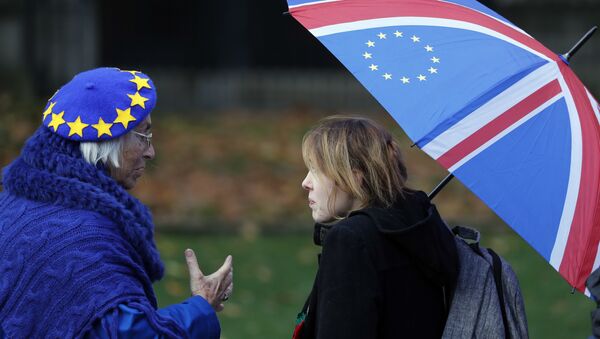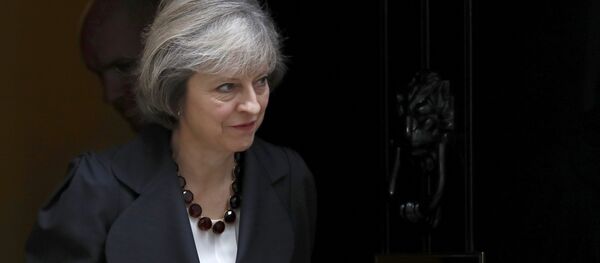In the meantime, the EU's Budget Commissioner Günther Oettinger has said that the bloc will accept France running a budget deficit higher than the EU's three percent ceiling. The official noted that this was a one-time exception and must not continue after 2019.
Oettinger also stated that French President Emmanuel Macron had lost authority by releasing a budget draft that exceeded the three percent deficit limit, however, Macron still remains a strong supporter of the European Union.
Sputnik: With the recent turmoil in France how likely is the country actually to secure a place as the world's 6th largest economy?
Douglas McWilliams: It is like a couple of people skiing downhill and they are both falling over, so you are never quite certain which one is going to get to the bottom first
READ MORE: Corbyn Urges May to Cut Parl't Christmas Break Short for Early Brexit Deal Vote
Sputnik: Absolutely! That's a good analogy.
Douglas McWilliams: Brexit is hugely disruptive. The disruption in France: a lot of it took place at weekends and I think they have started to find a way of dealing with the problem. In the UK, for a start our petrol taxes are still higher than they are in France then the ones in France they were protesting about.
So we shouldn't sort of congratulate ourselves too much on that. But secondly, Brexit, even if you are pro-Brexit, it is impossible to make such a lurch in your economic direction without slowing down.
I mean you can't steer around a 90-degree corner without putting a foot on the brake before you get there. And that's effectively what we're going to have in the UK. It's going to be pretty disruptive. We've already had investors sitting on their hands. We've had, I think, three consecutive quarters now of falling business investment. And people are waiting to find out what will happen.
Sputnik: What about France then, are they likely to take over from the UK to secure this place as the 6th largest economy?
Douglas McWilliams: It would be a temporary overtake, but we think that by 2020 the usual service will be resumed and the UK will overtake again. Remember that France has still got quite a lot of advantages.
It has got one of the best-educated labour forces in the world. They are very highly productive, very high quality of life. They have got an amazing agri-food sector: food and wine. They're even starting to make French whisky, would you believe? You know they have got a very powerful sector there.
READ MORE: UK to Kick-Start No-Deal Brexit Preparations Due to Deadlock Situation
Sputnik: I think most of us understand that there is going to be a slowdown, you alluded to it, but how slow is this slowdown going to be? Is it going to be 5 percent, 10 percent there? What figures have you actually shared with the business world?
Douglas McWilliams: It assumes the worst case, everything going wrong. In life, you tend to find some things go wrong but it is very rare that every single thing goes wrong at the exact same time.
I think what we will see is growth slowing temporarily, virtually to a halt. There might even be a technical recession of two negative quarters in a row but that it shouldn't get much worse than that, assuming the global economy doesn't collapse. And I am working on the basis that the global economy, though it might collapse, probably won't.
I mean you saw how the American stock market after going all the way down sort of bounced back up again. God knows where it is going to go next week but I mean there is some resilience in the system. I think what we could see is a slightly weak first half of the year for the world economy, but then picking up.
Sputnik: You have also stated in 2026 Britain will still be a bigger economy than France as France is not really going to terms with reducing its bloated public sector. And this is obviously what other the issues in France that are currently manifesting itself, resulting in the higher taxes. Why is that and what measures need to be taken to change France's position moving forward?
Douglas McWilliams: France has got to do two things really and President Macron knows this. He came to power saying he was going to do this. The first is to make the public sector a more realistic size. You can't normally get away with a public sector more than half of your economy or you can't do it for a very long amount of time. I mean in normal countries it is about 40 percent.
You should be able to pay for most of the things you need without pushing taxes to the point where they become exorbitant if you keep public spending roundabout there. And the French got over the top. They got away with it for longer than most but then eventually that chicken comes home to roost. They have to bring their public sector down. The other thing they have to do is reform their labour market because it is virtually impossible to sack someone in France.
And because it is virtually impossible to sack someone in France people won't employ them except on various sort of slightly fudged temporary contracts and things like that. And they have got a real problem with sort of people getting proper permanent jobs. And it is hard to get investment into a country when employers have so few rights over their employees.
You need to get a more balanced situation where employers have got rights as well as the employees having rights. And they will have to change that over time in France. And also they have got a very bloated social security budget where people retire remarkably early on a quite good income. Again that affects the scale of the labour force. It is a nice way to live if you can afford it but gradually over time, they can't afford it.
READ MORE: 'It's Dividing Neighbours, Friends': UK Politician Says Brexit Spat Escalating
Sputnik: Following the referendum for Brexit, the British government slowed down, growth now is the lowest in almost a decade. However, you have noted the Brexit in the long-term can even boost the UK's economy. Perhaps you just could elaborate a little bit on that and whether you think a no deal Brexit is really is damaging and is as serious as a lot of the commentators are elaborating?
Douglas McWilliams: I mean in the last year the British economy has grown by 1.9 percent, the French economy has grown by 1.5 percent and the German economy has grown by 1.1 percent. You talked about a slowdown, it has slowed. Actually, the slowdown started two years before Brexit but it hasn't slowed even to the same rate of growth as they have elsewhere in equivalent European countries.
So, I think it is important not to exaggerate the effect of Brexit so far. Brexit will certainly have a disruptive effect in 2019 which may continue for a while but remember that Europe is a declining part of the world economy. It used to be a third of the world economy. Our forecast says that by 2033 it is going to be no more than 15 percent of the world economy in other words smaller than China is today.
Views and opinions, expressed in the article are those of Douglas McWilliams and do not necessarily reflect those of Sputnik







